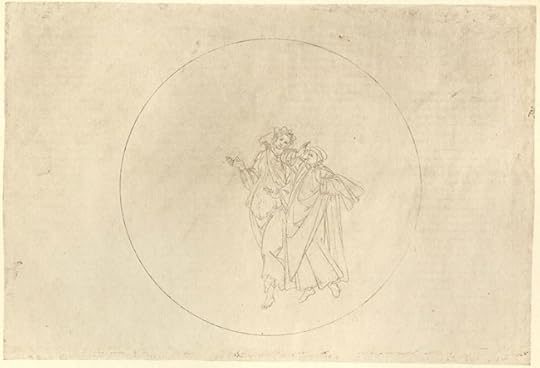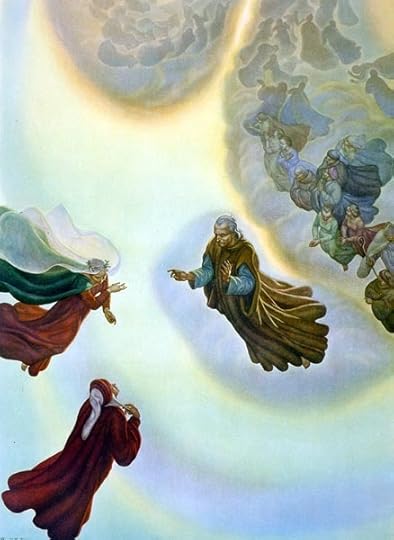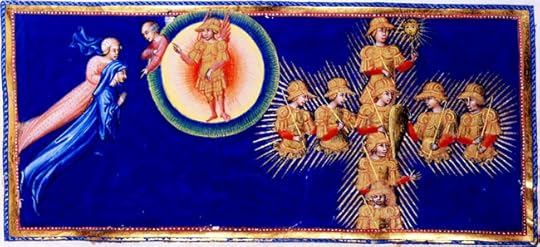Classics and the Western Canon discussion
Divine Comedy, Dante
>
Paradiso 15: Mars/Dante and his Ancestor
date newest »
newest »
 newest »
newest »
 http://www.lockportstreetgallery.com/...
http://www.lockportstreetgallery.com/...
Salvador Dali: Paradiso Canto 15. “Cacciaguida’s History Lesson.”
 http://www.worldofdante.org/media/ima...
http://www.worldofdante.org/media/ima...(Another that hardly seems unique.)
Sandro Botticelli: Paradiso Canto XV.1. “Fifth Planetary Sphere (Heaven of Mars); Cacciaguida, An Ancestor of the Alighieri Family, Tells Dante of His Forbears in Florence.” c.1480 - c.1495. Drawing.

 Lily wrote: "http://www.worldofdante.org/media/ima...
Lily wrote: "http://www.worldofdante.org/media/ima...(Another that hardly seems unique.)
Sandro Botticelli: Paradiso Canto XV.1. “Fifth Planetary Sphere (Heaven of M..."
Oh, a picture of two people talking! :)
 (Clearer image:) http://www.worldofdante.org/media/ima...
(Clearer image:) http://www.worldofdante.org/media/ima...
John Flaxman: Paradiso Canto XV.133. “Cacciaguida’s Mother Invokes Virgin Mary.” 1793. Engraving.
 http://etcweb.princeton.edu/dante/pdp...
http://etcweb.princeton.edu/dante/pdp...
Amos Nattini: Paradiso Canto XV. "Benigna volontade in che si liqua, 1923
 http://www.worldofdante.org/media/ima...
http://www.worldofdante.org/media/ima...Giovanni di Paolo: Paradiso Canto XV.28. “Cacciaguida Addresses Dante in the Heaven of Mars.” c.1450. Manuscript illumination. Yates Thompson 36. British Library.

 "As through the clear and tranquil evening sky
"As through the clear and tranquil evening skyfrom time to time a sudden fire will shoot,
drawing the eyes that just before had calmly gazed, (15)
"and seems a star escaping from its place—
except from where it first was kindled
no star is missing and it lasts but a brief while—(18)
"so from the arm of that great cross
extending on the right a star raced to the foot
of the resplendent constellation there. (21)
"Nor did this jewel leave its ribbon,
but ran along the shining band so that
it seemed a flame that glows in alabaster." (24)
Dante (2012-07-18). Paradiso (Kindle Locations 6159-6185). Hollander Translation. Random House, Inc.
Here the burst of fire is a shooting star, not embers.
 "But for mortals, as you well know,
"But for mortals, as you well know,the will to act and the power to carry through
have wings that are not feathered equally," (81)
Dante. Paradiso (Kindle Location 6321-6326). Ibid.
Smiled at this bit of folk wisdom.
 "Nor did a newborn daughter make her father fear,
"Nor did a newborn daughter make her father fear,for marriage age and dowry were not yet extreme," (104)
Dante. Paradiso (Kindle Locations 6379-6382). Ibid.
Smiled at this, too. And recalled the day when I was new to NYC culture and one of our corporate lawyers walked in, ecstatic about his first-born, a daughter, and regaling us with his calculations of the needs for her wedding reception as he walked away from the hospital!



THE SOULS OF THE GREAT CROSS stop their singing in order to encourage Dante to speak, and one among them descends to the foot of the cross like a shooting star, glowing with foy at the sight of Dante. It is, as Dante will discover, CACCIAGUIDA, Dante’s own great-great-grandfather. Cacciaguida addresses Dante as “Blood of mine,” and though he already knows Dante’s thoughts, he begs his descendant to speak them for the foy of hearing his voice. . Dante does as he is bid, and Cacciaguida, in answer to Dante’s request, identifies himself, gives an ACCOUNT OF ANCIENT FLORENCE, and explains how he followed CONRAD in the Crusades, BECAME A KNIGHT, and died in battle passing from MARTYRDOM TO BLISS.
Reynolds/Sayers:
Cacciaguida:
In the story, this encounter between Dante and his illustrious ancestor is one of the most poignant and climactic moments in the poem. Of all the souls with whom he has conversed in Hell, Purgatory and Paradise, this is the one from whom his life-blood flows. Cacciaguida claims him insistently as his ‘blood’, his ‘seed’, his ‘son’, his ‘branch’, and renders thanks to God for the measureless grace whereby his descendant has visited Heaven. The link, so intimate and personal, between ancestor and scion, is also the link between past, present and future which binds all men in an unending chain of heritage. From Cacciaguida to Dante flows not only the blood of illustrious forbears but also the past events of Florence, the history of Christendom, the inheritance of sin and of redemption, the burden and the glory of the Cross.
Florence of olden times:
The ideal of twelfth-century Borence as a free Commune, confined within her ancient walls and peopled by upright and simple-living republicans, is conveyed by Cacciaguida in moving and nostalgic terms, mingled with stern reproach for the immoral influences which have since corrupted the city. In the allegory, the decline of morals in Florence is an instance of that widespread increase of evil throughout the world, the causes of which are the subject of Inferno and Purgatory, the remedy for which Dante believes it to be his mission to proclaim.